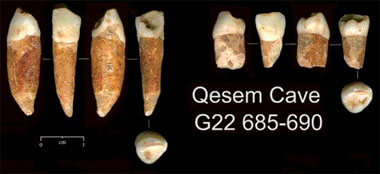|
Was Israel the
birthplace of modern humans?
It has long been believed that modern humans emerged from the
continent of Africa 200,000 years ago. Now Tel Aviv University
archaeologists have uncovered evidence that Homo sapiens roamed the land
now called Israel as early as 400,000 years ago - the earliest evidence
for the existence of modern humans anywhere in the world.
|

The find at the Qesem Cave |
The findings were discovered in the Qesem Cave, a pre-historic site
located near Rosh Ha'ayin that was first excavated in 2000. Prof. Avi
Gopher and Dr. Ran Barkai of Tel Aviv University's Department of
Archaeology, who run the excavations, and Prof. Israel Hershkowitz of
the university's Department of Anatomy and Anthropology and Sackler
School of Medicine, together with an international team of scientists,
performed a morphological analysis on eight human teeth found in the
Qesem Cave.
This analysis, which included CT scans and X-rays, indicates that the
size and shape of the teeth are very similar to those of modern humans.
The teeth found in the Qesem Cave are very similar to other evidence of
modern humans from Israel, dated to around 100,000 years ago, discovered
in the Skhul Cave in the Carmel and Qafzeh Cave in the Lower Galilee
near Nazareth. The results of the researchers' findings are being
published in the American Journal of Physical Anthropology.
Qesem Cave is dated to a period between 400,000 and 200,000 years
ago, and archaeologists working there believe that the findings indicate
significant evolution in the behaviour of ancient humans. This period of
time was crucial in the history of humankind from cultural and
biological perspectives. The teeth that are being studied indicate that
these changes are apparently related to evolutionary changes taking
place at that time.
Prof. Gopher and Dr. Barkai noted that the findings related to the
culture of those who dwelled in the Qesem Cave - including the
systematic production of flint blades; the regular use of fire; evidence
of hunting, cutting and sharing of animal meat; mining raw materials to
produce flint tools from subsurface sources - reinforce the hypothesis
that this was, in fact, innovative and pioneering behaviour that may
correspond with the appearance of modern humans.
According to researchers, the discoveries made in the Qesem Cave may
overturn the theory that modern humans originated on the continent of
Africa. In recent years, archaeological evidence and human skeletons
found in Spain and China also undermined this proposition, but the Qesem
Cave findings, because of their early age, is an unprecedented
discovery.
Excavations at Qesem Cave continue and the researchers hope to
uncover additional finds that will enable them to confirm the findings
published up to now and to enhance our understanding of the evolution of
humankind - especially the emergence of modern man.
Courtesy: Science Daily |

